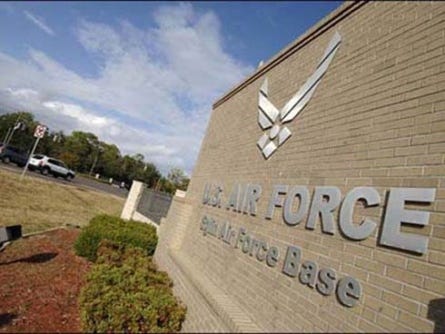
The Pentagon has reduced the number of days civilian workers will be required to take unpaid leave this fiscal year.
The unpaid leave, or furlough, will be for up to 14 days instead of the 22 originally planned. It must be taken by the end of September.
The decision was made after President Barack Obama earlier this week signed a bill giving the Department of Defense more flexibility in implementing steep budget cuts by the end of the fiscal year. The DoD said the bill puts $10.4 billion back into this year’s budget.
Secretary of Defense Chuck Hagel said at a press conference Thursday that 14 furlough days will account for about $2.5 billion in cuts, versus about $4.5 billion the 22 days would have cut.
“These numbers are floating as you all know, but it’s good news,” Hagel said.
Watch a video of the press conference.
More than 5,000 civilian workers are employed at local bases, and many have expressed concerns about how they will handle the pay cuts resulting from the furlough.
The Defense Department has yet to release 30-day notice of the furloughs, but if it does require the full 14 days and the furlough goes into effect in May — the soonest it could begin — workers will see about a 15 percent reduction in their paychecks over five months.
In comparison, the 22 days would have resulted in about a 20 percent pay cut.
Local workers’ representatives had mixed reactions to the announcement Thursday.
Rocky Tasse, president of the American Federation of Government Employees Local 1942, said while the reduction in lost days is positive, it still results in a significant pay cut for defense workers.
“We’re still getting furloughed for 14 days, so that’s almost three work weeks,” he said. “While we’ve stopped the hemorrhaging, we still have a major bleed.”
He and other union representatives pointed out that the $10 billion should be enough to eliminate the need for furloughs altogether.
“If they can cut eight days just imagine what they should be able to do if they really put their nose to the grindstone,” Tasse said. “They should be able to eliminate the furlough completely.”
Meanwhile, civilian employees continue to have questions.
The American Federation of Government Employees Local 1897, which represents almost 4,000 local blue-collar defense workers, has been inundated with calls and concerns about the furlough.
Last week, Alan Cooper, vice president of the union, said they were fielding 150 to 200 inquiries a day.
Many people are concerned about making ends meet, and a lot of uncertainty remains over how and when the furloughs will be implemented weeks after the Defense Department raised the possibility.
The union has boosted staffing at its two offices and tries to have the call centers manned with at least two volunteers eight hours a day.
They refer concerned workers to the Employee Assistance Programs and Airman and Family Readiness Centers at local bases.
They also suggest calling their chaplain for consolation to help them cope with added stress and anxiety over the impending loss in pay.
“The (workers) are using the word stress a lot more than they did two weeks ago,” Cooper said.
Tasse said he is concerned about the well-being of the workers, who already are under financial pressure after taking a pay cut several years ago.
His main priority is getting accurate and up-to-date information to his employees to try to alleviate some of the added anxiety.
“I don’t want people throwing in the towel thinking that the sky is falling,” he said. “There are too many uncertainties. We’re going down this path together.”
Some callers are reporting that their managers already are dictating how they will be able to take their leave, which could be in violation of an agreement the unions signed with the Air Force, Cooper and Tasse said.
The agreement states that after a notice of the furlough is issued, employees will have 30 days to request how they want to take their leave. Options include one day a week, longer chunks or one stretch, whatever works best for them.
Managers must review the request, but will have the final say on how furloughs are implemented.
Tasse and Cooper said dictating how the leave can be taken before the notice even has been issued appears to be in violation of the agreement.
Cooper said he wants workers to know the union is putting groundwork in place so that when the furloughs take effect it will be able to serve as a watchdog to make sure it is implemented legally.
“I want to be able to look (employees) in the eye and say ‘I understand it hurts. I’m going to get furloughed, too, but in the end the agency got it right,’ ” he said. “If we can do that I think all parties will be satisfied that we followed the rules and did this the best we could.”
Contact Daily News Staff Writer Lauren Sage Reinlie at 850-315-4440 or lreinlie@nwfdailynews.com. Follow her on Twitter @LaurenRnwfdn.
This article originally appeared on Crestview News Bulletin: Pentagon reduces length of furloughs for civilian employees
